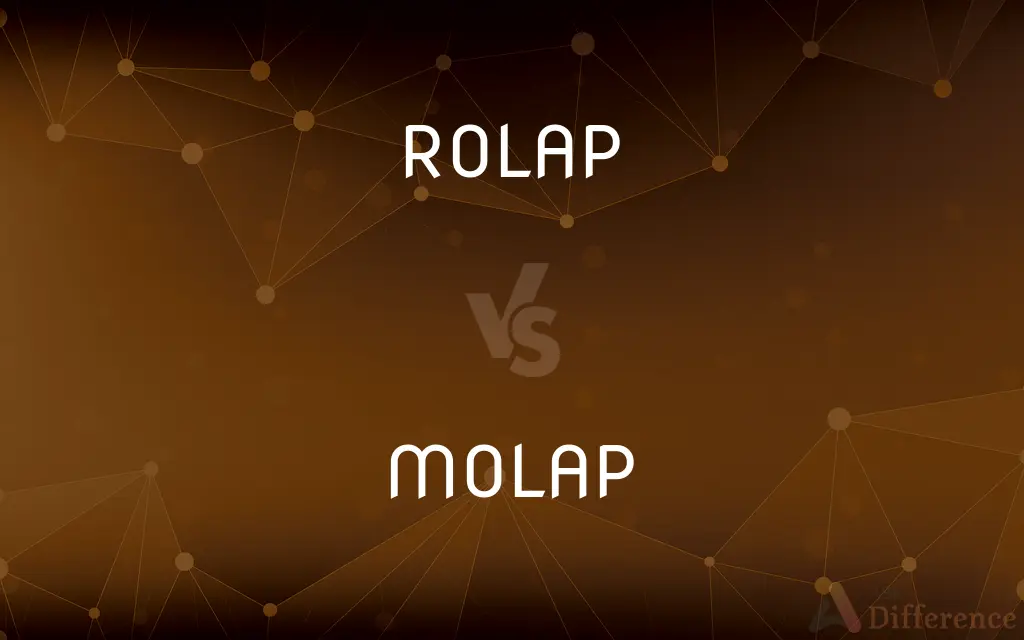ROLAP vs. MOLAP — What's the Difference?
Edited by Tayyaba Rehman — By Fiza Rafique — Published on January 9, 2024
ROLAP (Relational OLAP) queries relational databases, while MOLAP (Multidimensional OLAP) uses precomputed, multidimensional cubes for data analysis.

Difference Between ROLAP and MOLAP
Table of Contents
ADVERTISEMENT
Key Differences
ROLAP, or Relational Online Analytical Processing, works directly with relational databases. It is designed to handle vast amounts of data and complex queries. ROLAP dynamically generates SQL queries to calculate aggregations as needed, which can result in slower response times compared to MOLAP.
MOLAP, or Multidimensional Online Analytical Processing, utilizes data stored in pre-calculated, multidimensional cubes. This method is optimized for quick data retrieval, enabling faster response times for queries. MOLAP is typically used when performance is a critical factor and the data volume is manageable.
ROLAP is generally more scalable than MOLAP because it can efficiently handle large and growing data sets stored within the relational databases. However, ROLAP may not offer the same level of performance for complex calculations as MOLAP, since it relies on on-the-fly data aggregation.
MOLAP's strength lies in its data processing speed. It pre-aggregates the data, which speeds up query responses, making it ideal for situations where analysis speed is crucial. However, MOLAP cubes can become large and may not be as scalable as ROLAP solutions, especially with extremely large datasets.
ROLAP is better suited for scenarios with highly detailed and unpredictable querying patterns, where the direct relational approach allows for greater flexibility. In contrast, MOLAP is better suited for standardized querying and reporting, where the predictability of cube dimensions allows for optimization.
ADVERTISEMENT
Comparison Chart
Data Storage
In relational database tables.
In multidimensional cubes.
Performance
Can be slower due to real-time calculation.
Typically faster with precomputed data.
Scalability
More scalable with growing data.
Best with fixed data size.
Flexibility
High flexibility for ad-hoc queries.
Less flexible, relies on cube structure.
Data Volume Handling
Handles large data volumes well.
Best for moderate data volumes.
Compare with Definitions
ROLAP
Dynamic SQL generation for complex data analysis.
ROLAP tools allow for on-the-fly aggregation during our data reviews.
MOLAP
Fast data retrieval through precomputed cubes.
MOLAP's precomputed cubes allow for instantaneous report generation.
ROLAP
OLAP technology that leverages SQL for multidimensional queries.
Using ROLAP, we can conduct multidimensional queries directly in SQL.
MOLAP
Analytical processing optimized for speed and consistency.
Our MOLAP system provides consistent reporting speeds.
ROLAP
Data querying that offers detailed and flexible analysis.
ROLAP's flexibility is essential for our varied analysis requirements.
MOLAP
OLAP using multidimensional database structures.
We utilize MOLAP for its efficient multidimensional data structure.
ROLAP
A scalable approach for OLAP on large datasets.
Our dataset's size demands the scalability of a ROLAP solution.
MOLAP
Cube-based analysis with predefined data aggregation.
The MOLAP cube has been set up to aggregate our monthly sales data.
ROLAP
Analytical processing using a relational database system.
The company used ROLAP to query their massive sales database.
MOLAP
OLAP that excels in predictable query environments.
MOLAP is our choice for environments with predictable query patterns.
Common Curiosities
What is ROLAP?
ROLAP is an OLAP technology that uses relational databases for complex analytics.
What is MOLAP?
MOLAP is an OLAP technology that uses multidimensional cubes for data analysis.
Which is faster, ROLAP or MOLAP?
MOLAP typically offers faster data retrieval due to its precomputed cubes.
Do ROLAP systems require more time to generate reports?
Yes, ROLAP can take more time for reports as it calculates data on demand.
Which is better for ad-hoc queries, ROLAP or MOLAP?
ROLAP is better suited for ad-hoc queries due to its flexibility.
Is MOLAP less flexible than ROLAP?
Yes, MOLAP is less flexible due to its reliance on predefined cube structures.
Is ROLAP compatible with all relational databases?
Yes, ROLAP can work with any relational database that supports SQL.
Can MOLAP work with non-numeric data?
MOLAP primarily works with numeric data as it's designed for numerical analysis.
Can ROLAP handle more data than MOLAP?
Yes, ROLAP is generally more scalable and can handle larger datasets.
Are MOLAP cubes difficult to change?
Yes, MOLAP cubes can be less dynamic and harder to modify than ROLAP structures.
Does MOLAP require a lot of storage space?
Yes, MOLAP can require significant storage for its multidimensional cubes.
Is training required to use MOLAP effectively?
Yes, users typically need training to navigate and use MOLAP systems effectively.
Are there any data size limitations for ROLAP?
ROLAP can handle very large data sizes, but performance may vary based on the database.
Can ROLAP be integrated with other business intelligence tools?
Yes, ROLAP can often be integrated with a variety of BI tools.
How often do MOLAP cubes need to be updated?
MOLAP cubes need to be updated based on the organization’s reporting needs, which could be daily, weekly, or monthly.
Share Your Discovery

Previous Comparison
Serial Port vs. Parallel Port
Next Comparison
Dipole Dipole Forces vs. London Dispersion ForcesAuthor Spotlight
Written by
Fiza RafiqueFiza Rafique is a skilled content writer at AskDifference.com, where she meticulously refines and enhances written pieces. Drawing from her vast editorial expertise, Fiza ensures clarity, accuracy, and precision in every article. Passionate about language, she continually seeks to elevate the quality of content for readers worldwide.
Edited by
Tayyaba RehmanTayyaba Rehman is a distinguished writer, currently serving as a primary contributor to askdifference.com. As a researcher in semantics and etymology, Tayyaba's passion for the complexity of languages and their distinctions has found a perfect home on the platform. Tayyaba delves into the intricacies of language, distinguishing between commonly confused words and phrases, thereby providing clarity for readers worldwide.
















































